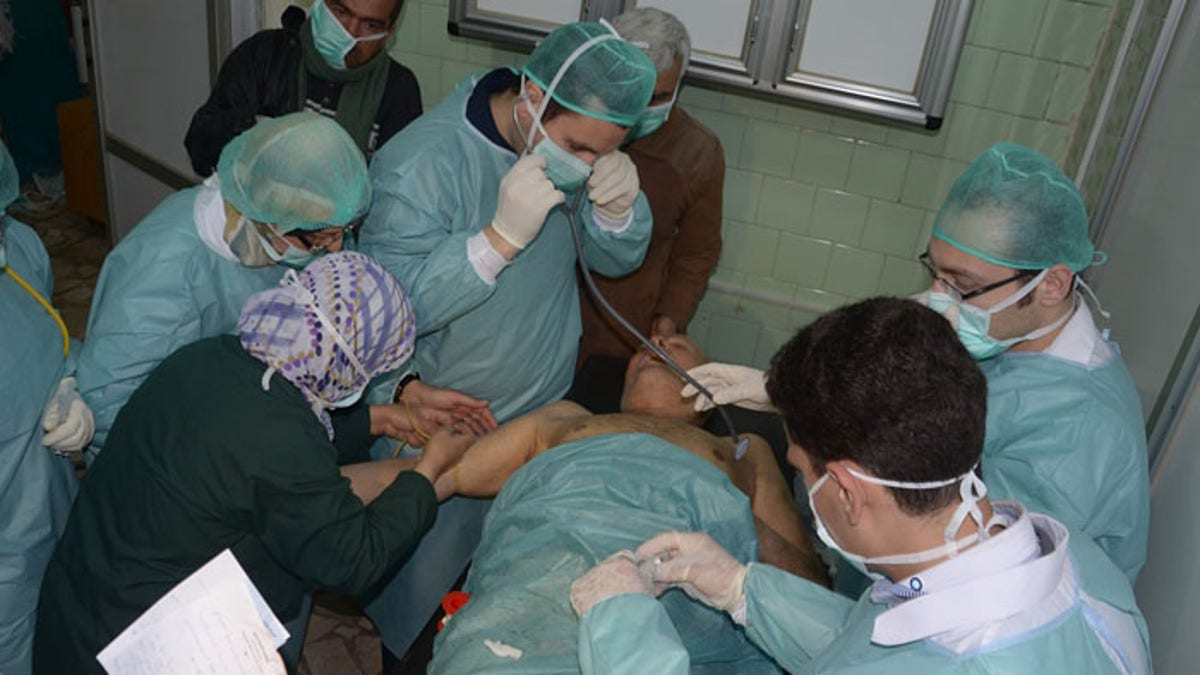
In this photo released by the Syrian official news agency SANA, a Syrian victim who suffered an alleged chemical attack receives treatment at a hospital in Aleppo. (AP Photo/SANA)
A small amount of chemical weapons was almost certainly used in Syria, a defense expert told FoxNews.com, but the window for verifying such an attack has likely closed.
Christopher Harmer, a senior naval analyst at the Institute for the Study of War, said Wednesday that it was “overwhelmingly likely” that a choking agent such as chlorine or phosgene was used by either Syrian rebels or the Bashar Assad regime, contradicting statements by the U.S. ambassador to Syria who said the Obama administration has no evidence to support Assad’s claims that U.S.-backed rebels used the weapons recently in northern Syria.
[pullquote]
“When you take the totality of the evidence, it seems obvious to me, or overwhelmingly likely, that a chemical weapon attack did take place,” Harmer said. “You had near simultaneous claims by both sides, independent reporting on the ground and a lot of patients at the hospital with the same symptoms.”
Other experts contacted by FoxNews.com expressed doubt that chemical weapons were used.
Harmer, the former deputy director of future operations at the U.S. Navy Fifth Fleet, said there’s a “good possibility” the usage was inadvertent or intentionally very limited to gauge international reaction.
The U.S. Department of Defense has extremely effective chemical weapons detection equipment, Harmer said, but since the amount of low-end chemical agents likely used in the purported attack on the village of Khan al-Assal in Aleppo were relatively limited, they have likely already dispersed — making detection extremely difficult.
“Even with a single round, there’s going to be some remnants, but it’s going to be fairly small,” Harmer said. “I just don’t think anybody’s going to put people in a free-fire zone right now to validate this.”
Drones fitted with chemical weapons-detecting equipment could also be flown over Syria to verify the claims. Harmer also suggested that U.S. defense officials have already confirmed the usage of the weapons but failed to release that information because the methods of collecting it is classified.
“If you tell what you know, you may very well expose how you found that out,” he said.
The most likely deployment of the weapons, according to Harmer, was a crude, unguided rocket attack, which coincides with reporting from the Syrian state-run SANA news agency. Choking agents like chlorine and phosgene could also be packed into a truck to be exploded, much like an improvised explosive device, Harmer said.
Syria’s Deputy Foreign Minister Faysal Mekdad said 31 people were killed and more than 100 others were wounded in the attack, some critically. A medical center aligned with the rebels said there were cases of “suffocation and poison” among civilians after a missile was fired at the area. The cases were most likely caused by regime forces’ use of “poisonous gases,” according to a statement.
Other chemical weapons experts contacted by FoxNews.com doubted that chemical weapons were used, especially given President Obama’s past statements that the use, deployment or transferring of the weapons would be a “red line” for possible military intervention in the two-year Syrian conflict that has killed an estimated 70,000 people.
“If used, they would be used by the regime to gauge international response, but we’ve been very clear that that’s one red line we would not tolerate,” said Barry Blechman, co-founder of the Stimson Center, a Washington-based organization that focuses on global security. “I don’t think we’re prepared to sit back like we did when Saddam Hussein used gas on the Kurds.”
An industrial accident, perhaps near or at a storage facility, was much more likely than an intentional release, Blechman said.
Greg Theilmann, a senior fellow at the Washington-based Arms Control Association, said chemical weapons like chlorine, phosgene or white phosphorous would not be an effective choice by either side given the fact that they do not localize attacks like a missile or rocket would.
Physical clues of a chemical weapons attack would be scarce except for spent shell casings, Theilmann added, saying the primary evidence to confirm or rule out the purported incident would be autopsies or doctor’s reports on the victims.
“It’s not a very good weapon for what they have to do there and what they have to pull off,” Theilmann said. “My best guess based on everything I’ve seen is that there was not the use of lethal chemical agents by either side. We would have seen more evidence had that been the case.”
The Associated Press contributed to this report.
